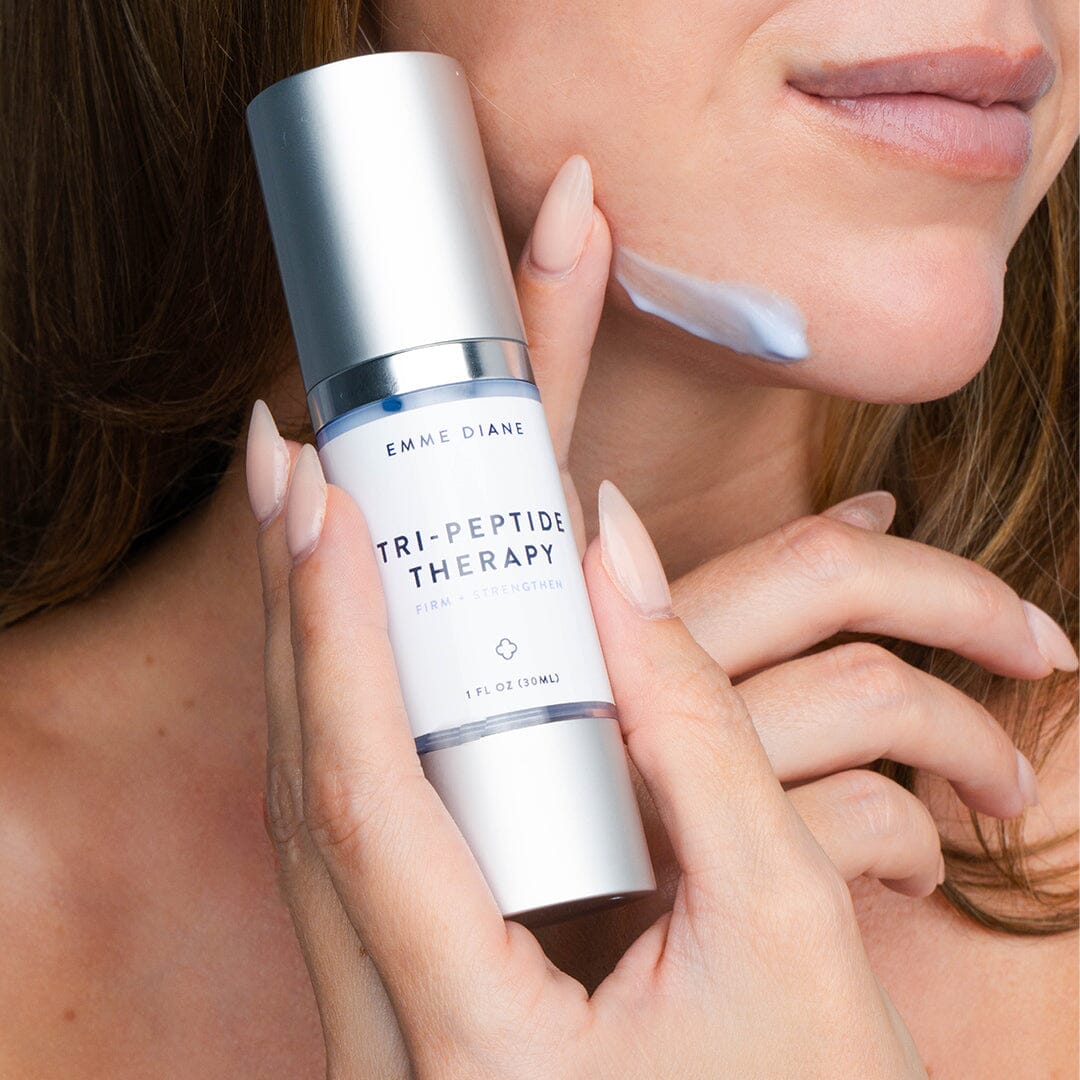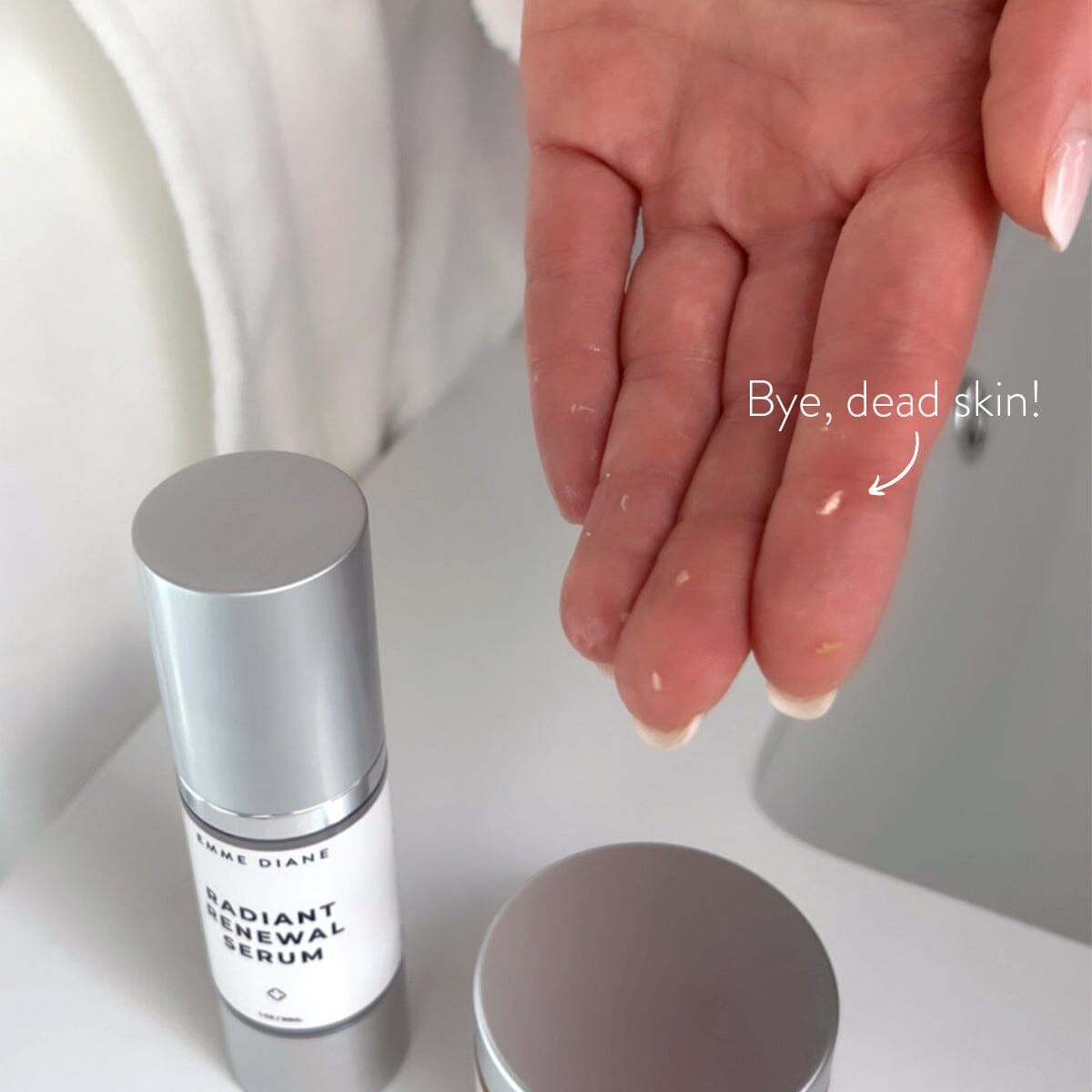Salicylic Acid VS Mandelic Acid: Which is Best?
by Emily Linehan on November 7, 2022
When it comes to clearing acne, there are so many different ingredients available! If you’re an existing client of mine, benzoyl peroxide or sulfur may be top of mind, but there are also two popular acids to consider: Mandelic acid and Salicylic acid.
While both of these are marketed to treat acne, they each have their own strong suits, so you’ll want to choose the one that’s most appropriate for your skin. In order to do this, it’s important to first understand the unique properties of each, which we will discuss below.
Mandelic Acid
If you’re an existing client of mine you’re likely familiar with Mandelic acid. Although it’s gained in popularity in recent years, I have utilized Mandelic acid since Emme Diane first began. In fact, my first-ever formulation, Clarifying Serum, originally included this key ingredient and still does today.
Mandelic acid is a member of the alpha-hydroxy acids family (AHAs). Similar to other AHAs (like glycolic and lactic acids), it is water-soluble and works to clear the skin by "ungluing" and shedding the dead skin cells on the surface of the skin before they are able to clog the pores. This results in clearer, smoother skin while also tackling the root cause of acne.
Due to its larger molecule size, mandelic acid is considered one of the most gentle AHAs. This is because its larger molecule size means it absorbs into the skin slower, making it less likely to cause irritation. This makes it great for sensitive skin, or for those new to incorporating acids into their routine.
Key Benefits
- Dissolves congestion in the pores to prevent acne formation
- Clears acne by speeding up cellular turnover
- Exfoliates to reveal a brighter, smoother complexion
- Brightens the skin and fades pigmentation, including acne scarring
- Boosts collagen production to improve fine lines and wrinkles
- Reduces redness and inflammation
- Can hydrate skin
Salicylic Acid
You may have seen a very popular acne fighting ingredient, Salicylic Acid, listed as an ingredient in our Pink Potion, or more recently, as the key component of our new Purifying Serum.
This is the only beta-hydroxy acid (BHA) used in skincare, and is oil-soluble. This means that it is able to penetrate the skin's lipid barrier to directly dissolve the keratin plugs and clear everything clogging the pore, making it ideal for stubborn blackheads and whiteheads.
In addition, it is able to regulate oil production and has an acidic pH which prevents the growth of bacteria that can lead to new breakouts.
Key Benefits
- Works deep within the pores to remove excess oil and impurities to clear even the most stubborn blemishes, including blackheads and clogged pores
- Gently exfoliates dead cells on the surface of the skin and accelerates cell renewal for a smoother, more even-toned complexion
- Helps regulate sebum production
- Anti-inflammatory properties help prevent the growth of bacteria that can lead to new breakouts
Which One Is Best?
Studies [1] have shown that both Mandelic and Salicylic acid are effective acne treatments. However, Mandelic acid (found in our Clarifying Serum) is more effective at treating inflamed acne, such as pimples, pustules, and cysts. Meanwhile, Salicylic acid (found in our Purifying Serum) has the upper hand when it comes to treating non-inflamed acne, such as blackheads and whiteheads.
Although they can both be effective in treating acne, mandelic acid is typically less irritating, which means it may be a better option for those with dry or sensitive skin. For those with oily skin, Salicylic acid's oil-solubility makes it a great option as it can penetrate deeper into the pore to dissolve dirt and oil, and control sebum production.
Can I Use Mandelic and Salicylic Acid Together?
While both offer unique benefits, they each work to exfoliate the skin. Because they both do this, using AHA’s and BHA’s together can lead to over-exfoliation and potentially cause irritation and redness. However, they can still be used within the same skincare routine (if the skin tolerates) by layering appropriately or alternating days.
Unfortunately, there is no one-size-fits-all solution when it comes to skincare, so it’s important to get a plan customized for your unique skin. If you’re new here, you can do that by starting with my free online consultation. Or, if you’re an existing client and are curious about incorporating either Mandelic or Salicylic acid into your routine, be sure to complete an online check-in so we can make any necessary adjustments to your routine!
xoxo, Emme
Sources
[1] Dayal, S, Kalra, KD, Sahu, P. Comparative study of efficacy and safety of 45% mandelic acid versus 30% salicylic acid peels in mild-to-moderate acne vulgaris. J Cosmet Dermatol. 2019; 19: 393– 399. https://doi.org/10.1111/jocd.13168


